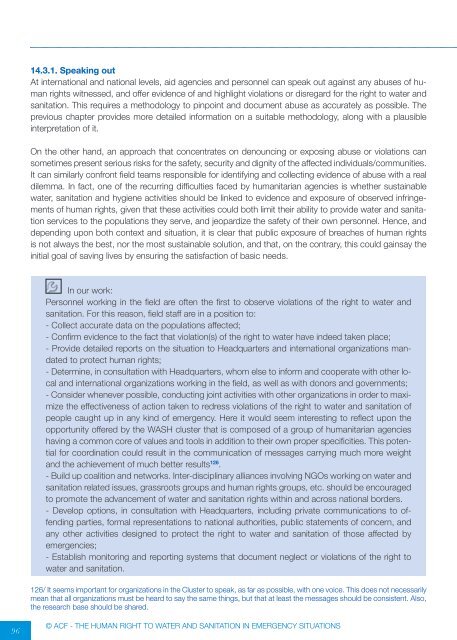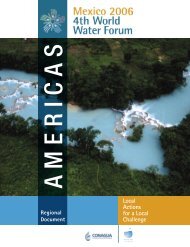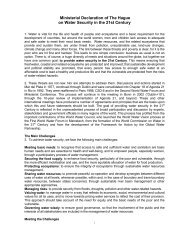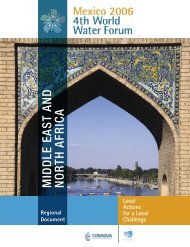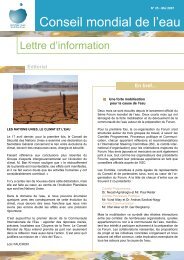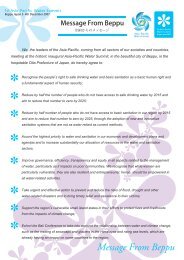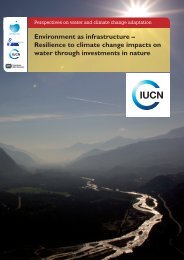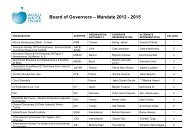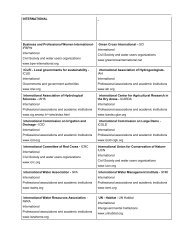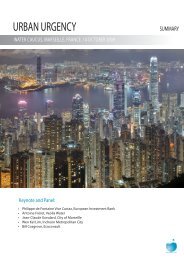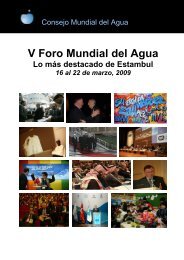the human right to water and sanitation in emergency situations
the human right to water and sanitation in emergency situations
the human right to water and sanitation in emergency situations
Create successful ePaper yourself
Turn your PDF publications into a flip-book with our unique Google optimized e-Paper software.
96<br />
14.3.1. Speak<strong>in</strong>g out<br />
At <strong>in</strong>ternational <strong>and</strong> national levels, aid agencies <strong>and</strong> personnel can speak out aga<strong>in</strong>st any abuses of <strong>human</strong><br />
<strong>right</strong>s witnessed, <strong>and</strong> offer evidence of <strong>and</strong> highlight violations or disregard for <strong>the</strong> <strong>right</strong> <strong>to</strong> <strong>water</strong> <strong>and</strong><br />
<strong>sanitation</strong>. This requires a methodology <strong>to</strong> p<strong>in</strong>po<strong>in</strong>t <strong>and</strong> document abuse as accurately as possible. The<br />
previous chapter provides more detailed <strong>in</strong>formation on a suitable methodology, along with a plausible<br />
<strong>in</strong>terpretation of it.<br />
On <strong>the</strong> o<strong>the</strong>r h<strong>and</strong>, an approach that concentrates on denounc<strong>in</strong>g or expos<strong>in</strong>g abuse or violations can<br />
sometimes present serious risks for <strong>the</strong> safety, security <strong>and</strong> dignity of <strong>the</strong> affected <strong>in</strong>dividuals/communities.<br />
It can similarly confront field teams responsible for identify<strong>in</strong>g <strong>and</strong> collect<strong>in</strong>g evidence of abuse with a real<br />
dilemma. In fact, one of <strong>the</strong> recurr<strong>in</strong>g difficulties faced by <strong>human</strong>itarian agencies is whe<strong>the</strong>r susta<strong>in</strong>able<br />
<strong>water</strong>, <strong>sanitation</strong> <strong>and</strong> hygiene activities should be l<strong>in</strong>ked <strong>to</strong> evidence <strong>and</strong> exposure of observed <strong>in</strong>fr<strong>in</strong>gements<br />
of <strong>human</strong> <strong>right</strong>s, given that <strong>the</strong>se activities could both limit <strong>the</strong>ir ability <strong>to</strong> provide <strong>water</strong> <strong>and</strong> <strong>sanitation</strong><br />
services <strong>to</strong> <strong>the</strong> populations <strong>the</strong>y serve, <strong>and</strong> jeopardize <strong>the</strong> safety of <strong>the</strong>ir own personnel. Hence, <strong>and</strong><br />
depend<strong>in</strong>g upon both context <strong>and</strong> situation, it is clear that public exposure of breaches of <strong>human</strong> <strong>right</strong>s<br />
is not always <strong>the</strong> best, nor <strong>the</strong> most susta<strong>in</strong>able solution, <strong>and</strong> that, on <strong>the</strong> contrary, this could ga<strong>in</strong>say <strong>the</strong><br />
<strong>in</strong>itial goal of sav<strong>in</strong>g lives by ensur<strong>in</strong>g <strong>the</strong> satisfaction of basic needs.<br />
In our work:<br />
Personnel work<strong>in</strong>g <strong>in</strong> <strong>the</strong> field are often <strong>the</strong> first <strong>to</strong> observe violations of <strong>the</strong> <strong>right</strong> <strong>to</strong> <strong>water</strong> <strong>and</strong><br />
<strong>sanitation</strong>. For this reason, field staff are <strong>in</strong> a position <strong>to</strong>:<br />
- Collect accurate data on <strong>the</strong> populations affected;<br />
- Confirm evidence <strong>to</strong> <strong>the</strong> fact that violation(s) of <strong>the</strong> <strong>right</strong> <strong>to</strong> <strong>water</strong> have <strong>in</strong>deed taken place;<br />
- Provide detailed reports on <strong>the</strong> situation <strong>to</strong> Headquarters <strong>and</strong> <strong>in</strong>ternational organizations m<strong>and</strong>ated<br />
<strong>to</strong> protect <strong>human</strong> <strong>right</strong>s;<br />
- Determ<strong>in</strong>e, <strong>in</strong> consultation with Headquarters, whom else <strong>to</strong> <strong>in</strong>form <strong>and</strong> cooperate with o<strong>the</strong>r local<br />
<strong>and</strong> <strong>in</strong>ternational organizations work<strong>in</strong>g <strong>in</strong> <strong>the</strong> field, as well as with donors <strong>and</strong> governments;<br />
- Consider whenever possible, conduct<strong>in</strong>g jo<strong>in</strong>t activities with o<strong>the</strong>r organizations <strong>in</strong> order <strong>to</strong> maximize<br />
<strong>the</strong> effectiveness of action taken <strong>to</strong> redress violations of <strong>the</strong> <strong>right</strong> <strong>to</strong> <strong>water</strong> <strong>and</strong> <strong>sanitation</strong> of<br />
people caught up <strong>in</strong> any k<strong>in</strong>d of <strong>emergency</strong>. Here it would seem <strong>in</strong>terest<strong>in</strong>g <strong>to</strong> reflect upon <strong>the</strong><br />
opportunity offered by <strong>the</strong> WASH cluster that is composed of a group of <strong>human</strong>itarian agencies<br />
hav<strong>in</strong>g a common core of values <strong>and</strong> <strong>to</strong>ols <strong>in</strong> addition <strong>to</strong> <strong>the</strong>ir own proper specificities. This potential<br />
for coord<strong>in</strong>ation could result <strong>in</strong> <strong>the</strong> communication of messages carry<strong>in</strong>g much more weight<br />
<strong>and</strong> <strong>the</strong> achievement of much better results 126 .<br />
- Build up coalition <strong>and</strong> networks. Inter-discipl<strong>in</strong>ary alliances <strong>in</strong>volv<strong>in</strong>g NGOs work<strong>in</strong>g on <strong>water</strong> <strong>and</strong><br />
<strong>sanitation</strong> related issues, grassroots groups <strong>and</strong> <strong>human</strong> <strong>right</strong>s groups, etc. should be encouraged<br />
<strong>to</strong> promote <strong>the</strong> advancement of <strong>water</strong> <strong>and</strong> <strong>sanitation</strong> <strong>right</strong>s with<strong>in</strong> <strong>and</strong> across national borders.<br />
- Develop options, <strong>in</strong> consultation with Headquarters, <strong>in</strong>clud<strong>in</strong>g private communications <strong>to</strong> offend<strong>in</strong>g<br />
parties, formal representations <strong>to</strong> national authorities, public statements of concern, <strong>and</strong><br />
any o<strong>the</strong>r activities designed <strong>to</strong> protect <strong>the</strong> <strong>right</strong> <strong>to</strong> <strong>water</strong> <strong>and</strong> <strong>sanitation</strong> of those affected by<br />
emergencies;<br />
- Establish moni<strong>to</strong>r<strong>in</strong>g <strong>and</strong> report<strong>in</strong>g systems that document neglect or violations of <strong>the</strong> <strong>right</strong> <strong>to</strong><br />
<strong>water</strong> <strong>and</strong> <strong>sanitation</strong>.<br />
126/ It seems important for organizations <strong>in</strong> <strong>the</strong> Cluster <strong>to</strong> speak, as far as possible, with one voice. This does not necessarily<br />
mean that all organizations must be heard <strong>to</strong> say <strong>the</strong> same th<strong>in</strong>gs, but that at least <strong>the</strong> messages should be consistent. Also,<br />
<strong>the</strong> research base should be shared.<br />
© ACF - THE HUMAN RIGHT TO WATER AND SANITATION IN EMERGENCY SITUATIONS


